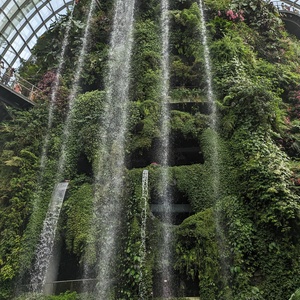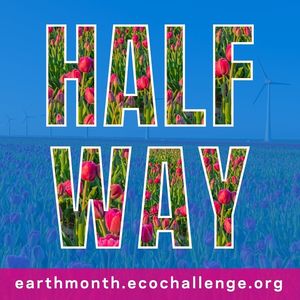Govardhan Kurrapothula
"It's our planet, it is our responsibility to keep our planet clean and green."
POINTS TOTAL
- 0 TODAY
- 0 THIS WEEK
- 1,008 TOTAL
participant impact
-
UP TO0.5pounds of CO2have been saved
-
UP TO485pieces of litterpicked up
-
UP TO1.0hourvolunteered
-
UP TO37advocacy actionscompleted
-
UP TO2.0community eventshosted or attended
-
UP TO94public officials or leaderscontacted
-
UP TO5.0treesplanted
-
UP TO115minutesspent learning
Govardhan's actions
Land + Forests
Regenerative Agriculture and Me
Regenerative agriculture focuses on farming and ranching in a way that supports life and restores the soil. I will spend 060 minutes learning about regenerative agriculture and find out if any nearby farms practice regenerative agriculture.
Land + Forests
Advocate for Forest Protection
Using my voice can help create a more sustainable and just world. I will contact 6 local, regional, or national decision makers to advocate for public policy that protects forests and improves their ability to sequester carbon and nourish biodiversity.
Climate + Air
Stay on the Ground
Carbon emissions from air travel is harmful to planetary and human health. Instead of traveling by plane, I will find an alternative way to accomplish the goals of an upcoming trip (i.e. telepresence, vacation locally).
Biodiversity + Wildlife
Seek Alternative Gifts and Souvenirs
When traveling, I will seek souvenirs that support local communities and do not cause harm to the environment or wildlife.
Biodiversity + Wildlife
Invest in Nature
A healthy world needs both our daily actions and support from larger systems. I will spend 120 minutes learning about how I can use my investments and savings to advance environmental sustainability.
Biodiversity + Wildlife
Plastic in Clothing and Water
Synthetic clothing can contain plastic and shed harmful microplastics into our water. I will use a microplastics catcher in my laundry, or install a microplastics filter for my washing machine.
Biodiversity + Wildlife
Save the Bees
Bees are vital to ecosystems. To help save the bees, I will learn which local flowers provide nectar and plant them in my backyard or in a pot on my balcony.
Land + Forests
Choose Eco-Friendly Wood and Paper
Trees provide food and habitat for local wildlife species, shade our streets and homes, and help keep our air and water clean by capturing pollutants. Buying products that help protect forests makes a difference. I will only purchase wood, furniture, and paper products from ecologically certified sources such as Forest Stewardship Council.
Land + Forests
Zero Waste Day
The impacts of our waste are far reaching. I will create zero waste for an entire day and share my reflections and learnings on the feed.
Land + Forests
Carry My Trash
I will carry all of my unrecyclable, non-compostable trash with me this month, to raise my awareness of how much I send to the landfill. I will post on the feed my reflections, conversations, and actions I will take moving forward.
Freshwater + Oceans
Reduce Pollutants in Cleaning
Understanding cleaning product ingredients and their effect on water and biodiversity is helpful to our consumer choices. I will spend 120 minutes learning about how cleaning products affect our water and try making my own cleaning products to reduce pollutants.
Freshwater + Oceans
Low Water Gardening
Grass lawns are water-intensive and on average require about 30 percent of a household’s water consumption. Native plants are water-efficient and help maintain the balance and diversity of local ecosystems. I will plant native species with water-efficient plants to conserve water and improve the habitat, then post a photo on the feed to share.
Freshwater + Oceans
Go Plastic-Free
Millions of tons of plastic is produced each year worldwide. Each day, I will conduct a plastics audit of what I buy and use throughout the challenge (kitchen, bathroom, personal care products, etc.), to see how single-use plastic shows up in my life. I will find plastic-free alternatives to these products and advocate for alternatives to single-use packaging at local grocery stores, product manufacturers, at work, or on campus.
Action Track: Community
Plant Trees
Trees capture carbon and produce oxygen that is essential to life on earth. I will support this important piece of nature by organizing or joining a community group to plant 12 native trees in my community, public parks, office location, campus or backyard.
Action Track: Community
Borrow Before I Buy
Why buy something I will only use once or a few times if someone nearby has it for me to borrow, and why not share something I have that someone may only need a few times a year? To reduce my consumption and waste, I will create or support the sharing economy with friends, family, colleagues or neighbors.
Action Track: Community
Join a Cleanup Effort
I will organize or participate in a trash pickup at a local river, beach, or natural body of water.
Climate + Air
Choose Renewable Energy
Renewable energy options are becoming more widespread and accessible. Not only are they good for the planet, they can help save money as well. I will sign up for my utility company's clean/renewable energy option. If my utility does not offer one, I will contact them to advocate for this option in the future.
Climate + Air
Consume only Needs vs Wants
The more stuff we consume, the more greenhouse gasses we put into the atmosphere. I will adopt a "Needs Vs. Wants" approach this month and only buy things I need.
Action Track: Community
Raise Awareness for the Conservation of Freshwater and Oceans
I will spend 60 minutes learning more about the importance of freshwater + ocean conservation, and how I can reduce my water use. I will share what I learn with people in person, on social media, and on the feed.
Action Track: Community
Pick Up the Phone
I will gather a group of friends, family, neighbors or colleagues to make 2 phone calls to public officials or companies to advocate for planet-friendly policies.
Action Track: Community
Write Letters or Emails
I will gather a group of friends, family, neighbors or colleagues and write 1 letters or emails to public officials or companies to advocate for planet-friendly policies.
Action Track: Community
Keep My Community Clean
At times it may not feel like it's up to us to keep our community clean and healthy, but we all have a role to play. Each day I am outside, I will pick up any litter I see.
Action Track: Community
Volunteer in my Community
I will volunteer 1 hours in my community.
Action Track: Community
Sustainability Lunch and Learn
Learning in a social setting can inspire connection and change. I will work with a friend or colleague to plan and host a lunch and learn at work, school, in my neighborhood or other location to learn more about an environmental topic important to me. After the lunch and learn, I will share more about it on the feed.
Action Track: Community
Share My "Why"
I will record a video to share why I am taking action this Earth Month, a sustainable swap I've made, and/or a local conservation effort in my area.
Participant Feed
Reflection, encouragement, and relationship building are all important aspects of getting a new habit to stick.
Share thoughts, encourage others, and reinforce positive new habits on the Feed.
To get started, share “your why.” Why did you join the challenge and choose the actions you did?
-
REFLECTION QUESTIONLand + Forests Carry My TrashThis is no small task! What was eye-opening to you throughout this action? How will you change your actions going forward to reduce the waste you produce?
 Govardhan Kurrapothula 4/30/2024 5:12 AMTry to swap single use items for sustainable alternatives. Use reusable bags, coffee cups and water bottles. Everyday items such as clingfilm, teabags and food containers all have zero-waste options too - there are so many ways you can cut down on plastic!
Govardhan Kurrapothula 4/30/2024 5:12 AMTry to swap single use items for sustainable alternatives. Use reusable bags, coffee cups and water bottles. Everyday items such as clingfilm, teabags and food containers all have zero-waste options too - there are so many ways you can cut down on plastic! -
REFLECTION QUESTIONFreshwater + Oceans Go Plastic-FreeWhere did plastic show up on your life that surprised you the most? What plastic alternative products did you discover you may switch to?
 Govardhan Kurrapothula 4/30/2024 5:11 AMGlass or metal containers. Give single-use plastic bags and containers the flick and opt for recyclable materials instead.
Govardhan Kurrapothula 4/30/2024 5:11 AMGlass or metal containers. Give single-use plastic bags and containers the flick and opt for recyclable materials instead. -
REFLECTION QUESTIONClimate + Air Consume only Needs vs WantsConsuming only what we need vs. what we want can be really hard to do. What has been challenging about committing to this action for a month? What have you learned about yourself? Will you change any habits going forward?
 Govardhan Kurrapothula 4/30/2024 5:10 AMEven harder than changing other people's minds is changing our own minds. Our mindsets influence our habits, behavior, and ultimately, the outcomes in our life.
Govardhan Kurrapothula 4/30/2024 5:10 AMEven harder than changing other people's minds is changing our own minds. Our mindsets influence our habits, behavior, and ultimately, the outcomes in our life. -
REFLECTION QUESTIONAction Track: Community Keep My Community CleanHow does the act of picking up litter connect you more to your community?
 Govardhan Kurrapothula 4/30/2024 5:08 AMTaking part in a local litter pick and actively spending time participating in your community can help you meet new people and enhance your sense of belonging.
Govardhan Kurrapothula 4/30/2024 5:08 AMTaking part in a local litter pick and actively spending time participating in your community can help you meet new people and enhance your sense of belonging. -
REFLECTION QUESTIONAction Track: Community Write Letters or EmailsHow might thinking creatively help us address big systems problems - like plastic pollution - differently?
 Govardhan Kurrapothula 4/30/2024 5:07 AMnnovations in biodegradable plastics, plant-based plastics, and recyclable plastics are offering eco-friendly alternatives to traditional plastics. Ocean cleanup initiatives and 3D printing with recycled plastics demonstrate creative solutions to address the plastic pollution problem.
Govardhan Kurrapothula 4/30/2024 5:07 AMnnovations in biodegradable plastics, plant-based plastics, and recyclable plastics are offering eco-friendly alternatives to traditional plastics. Ocean cleanup initiatives and 3D printing with recycled plastics demonstrate creative solutions to address the plastic pollution problem. -
 Govardhan Kurrapothula 4/30/2024 5:06 AMLook deep into nature, and then you will understand everything better.
Govardhan Kurrapothula 4/30/2024 5:06 AMLook deep into nature, and then you will understand everything better. -
REFLECTION QUESTIONLand + Forests Advocate for Forest ProtectionHigher standards of living are very often dependent on moving our environmental costs elsewhere. What are some specific ways in which the environmental impacts of your own lifestyle might be shifted elsewhere?
 Govardhan Kurrapothula 4/29/2024 5:13 AM
Govardhan Kurrapothula 4/29/2024 5:13 AM
The first step in dealing with the present impact of human activity is to correctly identify the nature of humanity’s relationship with the environment and how human actions affect that relationship. Many people still see the environment as something people must overcome, or they regard environmental needs as something that ought to be balanced against human needs (eg, jobs vs. the environment). Most people still regard the environment as a provider of commodities or a receptacle for waste.
When asked to name humanity’s primary environmental problems, people typically think of running out of nonrenewable raw materials and energy or about water and air pollution. Environmental research and development institutions focus on ways technology can help solve each problem, such as fuel cells to supply clean, potentially renewable energy or scrubbers to curb smokestack pollution. Even when people worry about biodiversity loss, they are concerned primarily with stopping the extinction of species, rather than with understanding the underlying losses leading up to species extinctions or the broader biological crisis that extinctions signal.
-
REFLECTION QUESTIONLand + Forests Choose Eco-Friendly Wood and PaperBeyond carbon sequestration, what other benefits do forests offer you personally?
 Govardhan Kurrapothula 4/29/2024 5:11 AMWhen forests absorb carbon from the atmosphere, they're helping regulate the climate and reduce the effects of climate change—benefiting all life on earth. The longer a forest is alive, the more carbon it can sequester, which is why it's important that we protect the forests we have now.
Govardhan Kurrapothula 4/29/2024 5:11 AMWhen forests absorb carbon from the atmosphere, they're helping regulate the climate and reduce the effects of climate change—benefiting all life on earth. The longer a forest is alive, the more carbon it can sequester, which is why it's important that we protect the forests we have now.-
 Sathya Harika Konduri 4/29/2024 5:16 AMAgree
Sathya Harika Konduri 4/29/2024 5:16 AMAgree -
 Pradeep Jaiswal 4/29/2024 5:12 AMGreat
Pradeep Jaiswal 4/29/2024 5:12 AMGreat
-
-
REFLECTION QUESTIONLand + Forests Zero Waste DayWhat was hard about having a Zero Waste Day? What did you learn about yourself and your habits?
 Govardhan Kurrapothula 4/29/2024 5:09 AMA zero-waste lifestyle is essential for reducing waste and promoting sustainable practices. Consumers can have widespread impacts on the environment and waste generation by making small changes to their buying behavior.
Govardhan Kurrapothula 4/29/2024 5:09 AMA zero-waste lifestyle is essential for reducing waste and promoting sustainable practices. Consumers can have widespread impacts on the environment and waste generation by making small changes to their buying behavior. -
REFLECTION QUESTIONLand + Forests Regenerative Agriculture and MeWhat did you learn about the practice and benefits of regenerative agriculture? How can you support healthy farming practices for people and the planet?
 Govardhan Kurrapothula 4/29/2024 5:08 AMAs a philosophy and approach to land management, regenerative agriculture asks us to think about how all aspects of agriculture are connected through a web—a network of entities who grow, enhance, exchange, distribute, and consume goods and services—instead of a linear supply chain. It’s about farming and ranching in a style that nourishes people and the earth, with specific practices varying from grower to grower and from region to region. There’s no strict rule book, but the holistic principles behind the dynamic system of regenerative agriculture are meant to restore soil and ecosystem health, address inequity, and leave our land, waters, and climate in better shape for future generations.
Govardhan Kurrapothula 4/29/2024 5:08 AMAs a philosophy and approach to land management, regenerative agriculture asks us to think about how all aspects of agriculture are connected through a web—a network of entities who grow, enhance, exchange, distribute, and consume goods and services—instead of a linear supply chain. It’s about farming and ranching in a style that nourishes people and the earth, with specific practices varying from grower to grower and from region to region. There’s no strict rule book, but the holistic principles behind the dynamic system of regenerative agriculture are meant to restore soil and ecosystem health, address inequity, and leave our land, waters, and climate in better shape for future generations.